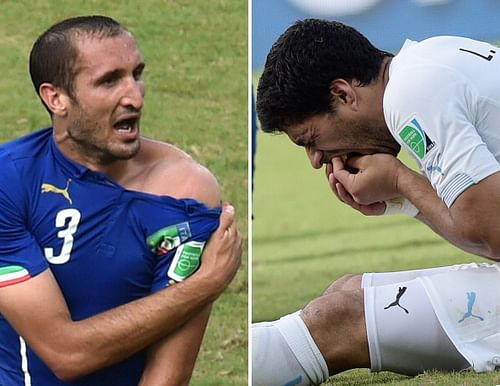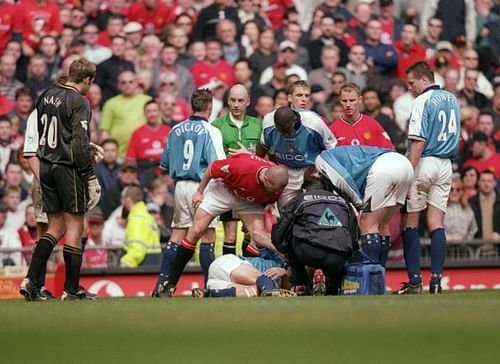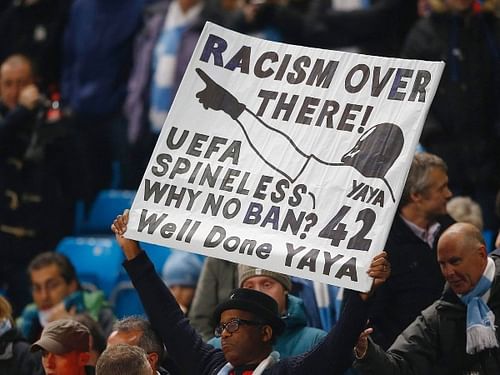
Is biting really the biggest crime in football?

Old habits die hard, they say. Take a look at sports for instance; sports personalities are people who swear by habits. They master their trade by inculcating habits, by building muscle memory, by practising to such an extent that even their reflexes seem controlled.
As Luis Suarez appeared in front of a three member CAS committee to appeal against what has been described as one of the strictest admonitions in international football, he wanted to allay FIFA’s fears that some of his habits wee getting the better of him, and thus try to reduce his ban. The ban, that sees him barred from any sort of involvement in things related to football, has a duration of four months, which means that Suarez won’t be able to link up with his new colleagues at Barcelona before October. Moreover, the ban also means he won’t be part of Uruguayan team for a year or so (9 international matches), leading him to miss the Copa America defence.
What transpired in the World Cup group stage game between Italy and Uruguay was blamed on the instincts or habits of Luis Suarez. A habit that seems visceral to say the least, for a bite seems like the most primal of attacking retorts. This was not the first time we saw him doing something of this manner either; the now famous bite of Branislav Ivanovic’s shoulder last year and the not so well known bite of PSV’s Otmal Bakkal during his tenure at Ajax have shown that he likes to react with his mouth – literally. And we all know his charge sheet has more than handful of biting cases on it.

Some say that Suarez is not fit to play the game and should be shunned from the sport exactly like this, so that he is not even seen near a football pitch or allowed to train with his club, and people are not wrong in questioning his frame of mind. Uruguay’s President Jose Mujica himself stated that the problem with Suarez is ‘psychological’ and that he needs to see a psychologist to come out of this unusual habit of gnawing on his opponents, so that he can avoid being pulled to pieces with various ridiculous banishments by the FIFA (though he was not that gentle with words in his address to FIFA and their bans).
While the Uruguayan president was really looking at the root of the problem, I am not sure the same can be said of the authority and the fans in general. We know what Suarez did was wrong. But the question of what constitutes an ideal punitive measure in order to set an example is still an open-ended one. More importantly, what makes this act worthy of total banishment more than other physical/psychological forms of aggression on the pitch that are on par or more deleterious in their impact on the opponent? In this particular case, Giorgio Chiellini getting bitten, for all that it was worth, may have accounted for a painkiller and tetanus shot and he would have been fit as a horse in matter of hours.
Biting? What about other dangerous acts?
So how does the pigeonholing of various football crimes work? And what is it that makes this biting business a crime in the eyes of football authorities? Is it the fact that bites are, as mentioned earlier, something primal, something seen in the playground perhaps in a game involving kids and rarely seen with professionals (exceptions: Mike Tyson)? Or is the act in itself so detestable, gross and sick that, at the first look of it, you go, ‘who in his right frame of mind would stick his mouth into the sweaty shoulder of an opponent, right?’
I guess the answer is more related to us and our perceptions. For it is us who set up the boundaries about what looks okay on the pitch and what can be termed sick. We are more or less set in ways about how things should be on the ground, and naturally anything new and alien to it is and would be treated with apprehension. But we do get the thought process behind all the other illegal acts.
We do not loathe a two-footed challenge as much, though we love reading biographies (nay, hagiographies) describing how Roy Keane took his revenge by injuring and debilitating another player, glorifying the whole act in the process and adding quotable quotes like: “The ball was there (I think). Take that, you c***! And don't ever stand over me sneering about fake injuries.”

Neither do we detest an intentional elbow in the face, for a little bit roughhousing seemed part of the game in the good old days and doesn’t seem like something to be detested in modern day football. And we “get it” that Pepe sometimes loses it, and in that mode, out of frustration, he can kick/try kicking an opponent lying on the pitch on his head. And we all like to build sculptures for the one or two of the effable head butts on the pitch.
But biting is unnatural and sick for us. Something of a similar ilk is spitting. Spitting too can be described as an obscure sort of retaliation, an act which we usually connote to lowliness and sickness of the doer.
Racism
This is another plague that has been associated with the game for long is way more impactful to a player psychologically than what a bite can ever do. The authorities are happy to put large banners about what to do with racism and simply ask for hefty fines from clubs seen propagating any sort of racism in their grounds.
If money is seen as equitable to something like racism, then I suggest we should fine all the other acts of aggression as well. What is the need for banning a player for four months when clubs who are time and again found notorious for their racisms/hooligans can get away with this by playing a handful of games behind closed door before the authorities mellow down on them?
What is more ironic, Russia, an epicenter of racism has been granted the opportunity to host world cup next time despite little or no improvement on curbing racist activities.

Head butts
A case parallel to Suarez’s is that of Zinedine Zidane. The French midfielder was a classic case of Jekyll and Hyde and he lived the part for most of his career (most notably seen in his last game – the 2006 World Cup final vs Italy). Purely sublime at his best and a man possessed with god knows what at his worst.
The man won every honour there is to be won was unable to control his darker, raw side. It was not that head butt on Marco Materazzi in the World Cup final that was his only blemish in a serene career; rather he had a knack of getting intimidated and was not shy of giving it back to anyone who tried to get on his wrong side.
The first time this side of his came to the fore was ‘98 France. The group stage game against minnows Saudi Arabia was a feisty affair. Though France overcame the Saudis, Zidane did get red carded for an unnecessary stamp on a Saudi player who had ruffled him a bit. He showed glimpses of his hot headedness in the 2000 Champions League encounter against Hamburg, where he head butted Jochen Kientz. The pattern of his brashness is there for all to see.
If Suarez has some demons that he needs to take care of, so did Zidane. The two players though have had a really contrasting reputation throughout their careers. While Zidane and his little problems have often been dusted under the carpet while talking about his legacy and his contribution to the game, Suarez is always vilified. Right from the handball to save his team from elimination at a critical stage of World cup 2010 to the present case, Suarez has always taken up the mantle of the media’s anti-hero. Is it just the media or are we partial at looking at things on the pitch ourselves as well?
Perhaps we are living too much depending on what others say, what the popular opinion on a popular networking site is. In that bid to conform to what everyone is saying must be true, we are losing our discretion. Zidane being the protagonist of statutes is described as dirge to that “misfortunate though understandable” head butt in the 2006 final, while Suarez finds himself being the butt of internet jokes while begging various authorities to intervene and mitigate the severity of his crime just about corroborates the fact.